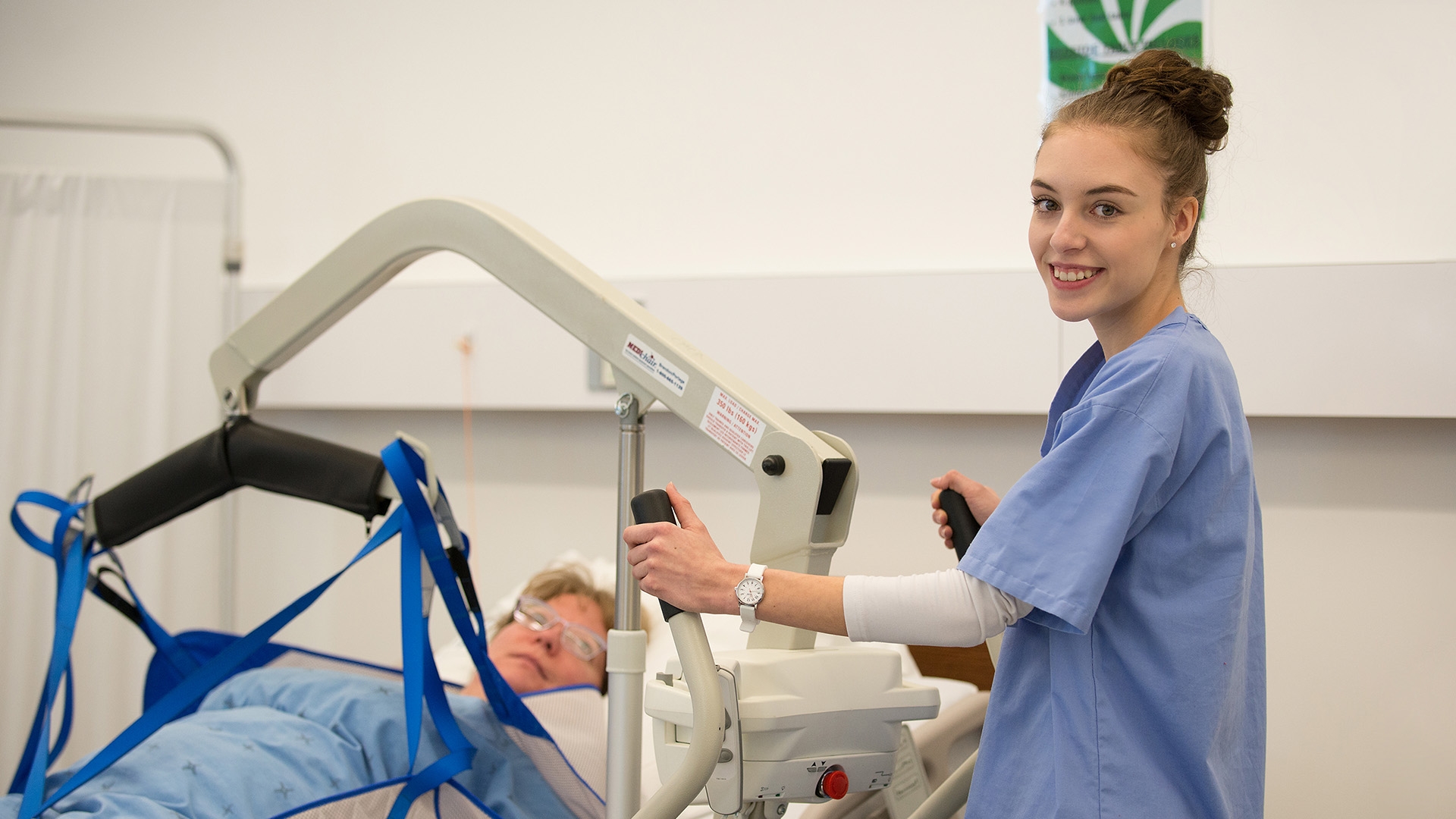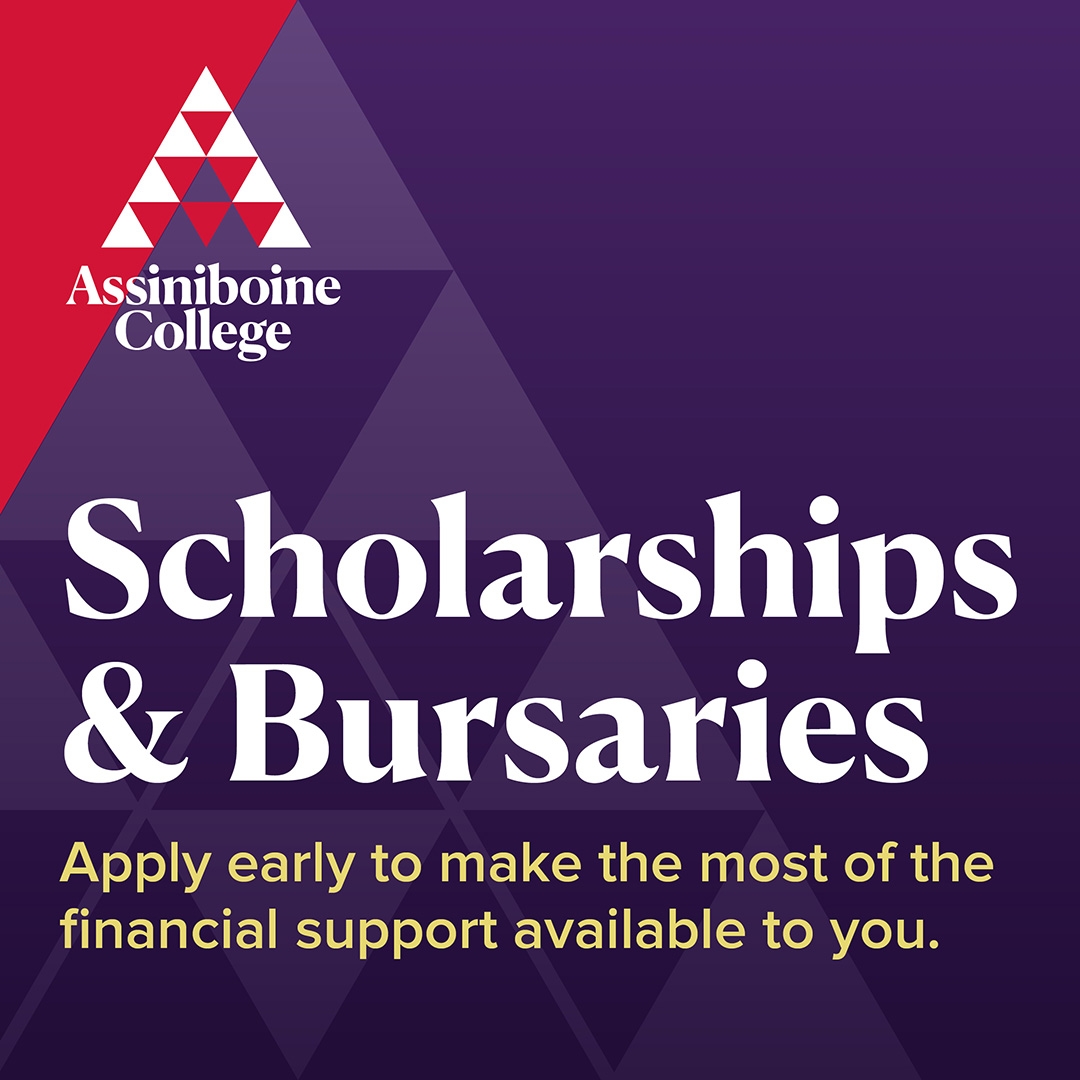Comprehensive Health Care Aide
Overview
Our six-month Comprehensive Health Care Aide program (nine-months for international students) prepares graduates to care for patients in a clinical setting. The program is available for study through distance education to domestic students only.
Health Care Aides assist nurses, hospital staff and physicians in the basic care of patients. They help patients with their well-being and assist in managing their health care environment, such as meal and mobility assistance, and observation and reporting of patient conditions.
Ready to take the next step?
Fill out the form below to receive more information about our program and related events.
Program Learning Outcomes
- Provide personal care and assistance in a safe, organized, and competent manner.
- Provide person-centred care and assistance that recognizes and respects the uniqueness of each individual client.
- Promote the physical, psychological, social, cognitive, and/or spiritual well-being of clients and families.
- Provide care and assistance for clients experiencing health, cognitive and/or mental health challenges.
- Interact with other members of the health care team in ways that contribute to effective working relationships and the achievement of goals.
- Communicate clearly, accurately, and in sensitive ways with clients and families within a variety of contexts.
- Recognize and respond to one’s own self-development, learning, and health enhancement needs.
- Perform the care provider role in a reflective, responsible, accountable, and professional and ethical manner.
Examples of what health care aides do:
- Bathe, dress and groom patients.
- Serve meal trays and feed or assist in feeding of patients.
- Lift, turn and massage patients.
- Assist patients with mobility, which may include moving patients in and out of beds, gurneys, and chairs.
- Supply and empty bedpans.
- Collect specimens such as urine, feces and sputum.
- Administer suppositories, colonic irrigations and enemas.
Success Factors
You might be a good fit for this program if you would enjoy:
- A career in the healthcare field.
- Providing basic care and assistance to patients.
- Working in a collaborative interdisciplinary team environment.
A valid driver’s license and access to a vehicle is strongly recommended given the potential need to travel for practicum placement.
The industry and program environment require individuals to:
- Be reliable, punctual, and regularly attend work.
- Communicate effectively with others including co-workers and patients.
- Demonstrate flexibility and adaptability to changing environments and work-related challenges.
- Evaluate the safety of a work site and potential hazards.
- Listen to direction and act on that accordingly.
- Move safely around the learning environment, skills lab, patient rooms and in a variety of clinical settings.
- Safely perform procedures and delegated tasks as directed by nursing and hospital staff.
- Safely perform static and physical tasks, such as standing, lifting, and kneeling.
- Provide proof of up-to-date immunization, current (within 6 months) criminal record vulnerable sector check, current adult abuse registry check, and current child abuse registry check prior to practicum placement or working.
- Work in shifts, schedules, and conditions that are unique to the industry.
Interested in exploring similar program options?
We've got you covered! Here's another great program option to consider.
Admissions
Admission Requirements
- A complete Manitoba Grade 12 or equivalent
- Proof of current certification in cardiopulmonary resuscitation – Health Care Provider (CPR-HCP) or Basic Life Support (BLS)
- Applicants in high school must be in grade 12 and submit their transcript and a principal's note, indicating the student is on track to graduate by the end of the first semester. (Virden only)
If you received your education outside of Manitoba, please review the equivalent admission requirements: Interprovincial or International.
English is the language of instruction at Assiniboine. All applicants educated outside of Canada or in a country not on the test exempt list are expected to meet the English language proficiency requirements. IELTS Academic score of 6.0 with no sub-score less than 5.5 (or equivalent) is acceptable for this program.
International Applications
International students enrolled in this program will complete BLS (basic life support) during the first three months of the program. You must successfully complete this training as a prerequisite for later courses.
READY TO TAKE THE NEXT STEP IN YOUR EDUCATION JOURNEY?
Start your online application today and join Assiniboine College!
DON'T MEET ADMISSION REQUIREMENTS?
If you don’t meet admission requirements, visit our Centre for Adult Learning to upgrade courses.
Program Continuation Requirements
While not admission requirements, all students in this program must be prepared to fulfill program continuation requirements. Students must obtain the following prior to their clinical placements in the program and these checks must be valid for the length of their clinical practicum placements.
It is the student's responsibility to ensure they request, pay for, and obtain these checks in the necessary time frames. If you have specific questions about these program continuation requirements, please contact our School of Nursing directly:
- Current Canadian criminal record vulnerable sector check
- Current adult abuse registry check
- Current child abuse registry check
- Up to date immunizations
In some situations, students with a criminal record may be unable to complete the program. Students listed on the Adult Abuse Registry or Child Abuse Registry may be unable to complete the program.
You will be required to provide proof of relevant immunizations soon after you begin the program. Information will be given to you early in the program so you can plan to complete and pay for immunizations you do not currently have. Without all immunizations, you will not be allowed to attend practicum placements required for graduation.
Careers & Connections
Career Opportunities
- Acute and extended-care facilities
- Personal care homes
- Private care facilities
- Mental health and community health settings
- Home care
- Private industry
See the National Occupation Code description for typical jobs here: Government of Canada National Occupation Code - Health Care Aide.
CHCA jobs in rural Manitoba (not the Winnipeg area) are on the Manitoba Provincial Nominee Program In-Demand Occupations list.
Connections
Assiniboine has a number of agreements with other colleges, universities and professional organizations, making it possible to apply credit taken at Assiniboine to programs at other institutions. For information on agreements, see Articulation Agreements.
Upon completion of this program, graduates will have the following certifications:
- Provincial Violence Prevention
- Workplace Hazardous Materials Information System (WHMIS)
- Personal Health Information Act (PHIA)
- N95 Mask Fit Testing
- Fire Safety
- Abuse and Neglect
- Electronic Patient Record (EPR) Training
- Safe Patient Handling
Tools & Supplies
Our labs simulate the health care setting, utilizing the most up to date equipment in order to accurately reflect potential situations in a variety of areas.
Our classrooms, labs and shops are equipped with the necessary equipment that you need to make the most of your experience. However, there are some tools and supplies that you will need to purchase for personal use to help you with your studies. Much of what you purchase you’ll be able to use after you graduate and begin your career.
Program Checklists, Textbooks, and Supplies
ASSINIBOINE BOOKSTORE
Textbooks, supplies and uniforms may be purchased at the Assiniboine Bookstore at the Victoria Avenue East Campus. Booklists are available from your school office 30 days prior to the start date of your program.
Technology Requirements
Students in this program are required to bring their own laptop for use on-campus. The laptop must meet the technical needs outlined by the program. See Technology Requirements for detailed information.
Courses & Costs
Costs
Estimated Program Costs (Domestic students)
| Credits | 33.0 |
| Tuition | $2,080 |
| Course Fees | $730 |
| Students' Association fees (including Health Premium) | $430 |
| Estimated textbooks, tools, and supplies | $1,500 |
All fees are estimated and subject to change without notice.
Estimated Program Costs (International students)
| Credits | 55.5 |
| Tuition and Fees | $18,395 |
| Course Fees | Included |
| Students' Association fees (including Health Premium) | Included |
| Required Health Insurance | $1,125 |
| Estimated textbooks, tools, and supplies | $800 |
All fees are estimated and are subject to change without notice. All international students must purchase health insurance. The college adds this fee to your student account and then sends your name and fee to the insurance provider on your behalf.
All International tuition and fees are required to be paid in full before your program begins. Tuition and fees to this program are non-refundable and non-transferable. All fees are estimated and subject to change without notice.
For more information, visit the Fees and Charges page.
Courses
To graduate with a Comprehensive Health Care Aide certificate, students must successfully complete 27 academic credits and 6 practical credits. International students must successfully complete 49.5 academic credits and 6 practical credits. Students must pass the four IAPP courses (listed below in the Courses section) to progress in the program. The minimum passing grade for each course is indicated on the course outline.
Courses
| Title | Credits/CEUs | Elective | Distance | PLAR |
|---|---|---|---|---|
College Foundations (PEDV-0356)This course improves students' ability to navigate the college experience and environment, including student's rights, roles, and responsibilities. In this course, students reflect on their skills, attitudes, and expectations and develop learning strategies to help them to become successful, resilient, and self-directed learners. The course covers topics such as success in online learning, time management strategies, learning strategies, assessment taking strategies, academic integrity, information and digital literacy, and wellness, among others. It integrates elements of student orientation. |
0 credit(s) | No | No | No |
Daily Living Laboratory (HLTH-0176)Corequisite: HLTH-0175 Daily Living Theory |
3 credit(s) | No | Yes | Yes |
Daily Living Theory (HLTH-0175)Corequisite: HLTH-0176 Daily Living Laboratory |
3 credit(s) | No | Yes | Yes |
Gerontology (HLTH-0004)This course enables the learner to explore their own attitudes towards old age and the aging process. It includes topics such as changes in normal aging, promoting wellness and independence, death and dying, and palliative care. |
3 credit(s) | No | Yes | Yes |
Growth and Development (HLTH-0003)This course provides a general overview of growth and development from infancy to late adulthood. Students examine normal physical, cognitive, social and emotional development through the stages of life. |
3 credit(s) | No | Yes | Yes |
Health Issues/Community Health (HLTH-0005)This course focuses on the basic structure and functions of the body systems. It involves topics that address problems affecting the following systems: respiratory, circulatory, neurological, musculoskeletal and endocrine. Cancer and the problems associated with this disease are discussed. Community health is discussed with a focus on agencies providing community health care, organization of work in community settings and assisting with elimination in the home care environment. This course provides for a campus laboratory component. |
3 credit(s) | No | Yes | Yes |
Health, Environment & Safety (WRKP-0002)This course introduces the learner to health care and its diverse environments. It includes topics such as the role of the health care aide, the health team, ethics and legal issues, organization for work and safety in the workplace. Topics such as infection control, providing a clean environment, communicable diseases, accident prevention, Workplace Hazardous Materials Information System (WHMIS) and fire safety are also discussed. |
3 credit(s) | No | Yes | Yes |
Human Relations/Communication (COMM-0037)This course provides a general overview of the basic communication process. It includes effective and ineffective communication techniques and provides for communication practice sessions. The course also focuses on values and goals clarification and includes topics such as social and emotional needs of clients, stress, families and their members, and caring for culturally diverse client groups. |
3 credit(s) | No | No | Yes |
Mental Health (HLTH-0006)This course focuses on the general issues affecting mental health and mental illness. It includes topics such as personality and behaviour, anxiety, eating disorders, personality disorders, schizophrenia, mood disorders, abusive behaviours, psychogeriatrics, activities and therapies, and non-violent crisis intervention. |
3 credit(s) | No | Yes | Yes |
Nutrition (HLTH-0002)This course focuses on the basic principles of promoting and maintaining a client's health and wellness related to diet. It includes topics such as menu planning, special therapeutic diets, mealtime, food handling and storage. This course includes a campus laboratory component. |
3 credit(s) | No | Yes | Yes |
Practicum 1 - CHCA (PRAC-0074)Prerequisites: HLTH-0175 Daily Living Theory, HLTH-0176 Daily Living Laboratory, HLTH-0004 Gerontology, WRKP-0002 Health, Environment & Safety, COMM-0037 Human Relations/Communications, HLTH-0002 Nutrition |
3 credit(s) | No | No | No |
Senior Practicum CHCA (PRAC-0040)Prerequisites: PRAC-0074 Practicum 1 - CHCA, HLTH-0003 Growth and Development, HLTH-0005 Health Issues/Community Health, HLTH-0006 Mental Health |
3 credit(s) | No | Yes | No |
Locations
Permanent Locations
Assiniboine has three permanent sites in the province that offer the Comprehensive Health Care Aide certificate:
Victoria Avenue East Campus | Brandon
- Intakes are offered twice a year in January and September (May and October for international students)
Winnipeg Campus | Winnipeg
- Intakes are offered once a year in May and October (open to international students only)
- Intakes offered in September 2026 and February 2027 (open to domestic students)
Parkland Campus | Dauphin
- Intakes are offered once a year in January
- New intake in September 2026 for international students only.
A 9 month Comprehensive Health Care Aide certificate (open to INTERNATIONAL STUDENTS only) will be starting at Parkland Campus in Dauphin if there is sufficient student demand. Sign up for our interest list to receive more information as soon as it's available.
Rural Rotating Sites
In addition to our permanent program sites, Assiniboine offers in-community training known as rural rotating sites (not open to international students). For rural rotating sites not offered in partnership with high schools, admission priority will be given to those who live in a rural community within 100 km of the site.
Stonewall
- Start: May 4, 2026
- 22 seats are available
- Applications are open
Distance Education
The Comprehensive Health Care Aide certificate program is available for study through distance education (domestic students only). To see when courses are being offered throughout the year, the costs and how long you have to complete them, click on the schedule below.
The deadline to register is the 20TH of the month prior to the specific course start date however, you can register at any time – you don’t need to wait for the deadline. For example, for February 1ST courses, the deadline to register is January 20th.
Please note, payment is required at the time of registration.
2025-26 Distance Education Schedule
Registration options
Active Student
- If you are an active Assiniboine student in the Comprehensive Health Care Aide program, you can register and pay online for your next course using Assiniboine Connect. You can also register directly with the Registrar's Office by calling 204.725.8701 to register with a credit card.
Not an Active Student
- If you are not an active Assiniboine student in the Comprehensive Health Care Aide program, but you are interested in taking a few courses, you may register for courses up to a maximum of 12 credits. Please register directly with the Registrar’s Office by calling 204.725.8701 to register with a credit card.
- If you wish to enroll in the program, you may do so by applying online.
Once you have registered for your course, you’ll get information about your instructor, how to purchase your textbook(s) and course delivery.
We recommend that you start with one course to get a feel for the course load. After that, it's up to you how many courses you take.
Policies
Please ensure that you review our academic policies, including policy A20: Refunds, Registration, Adding and Dropping of Courses, which explains the refund policy for distance education courses; and A10: Maintaining Active Student Status, which details how often you need to complete a course to remain active in your program. You have five years to complete a program.
Frequently Asked Questions
When is the next program information session?
Program information sessions are completely free to attend, and we invite you to bring a guest along as well. It's a good idea to register in advance so we know you're coming.
To find the complete schedule for our program information sessions and to RSVP, visit the program information session page.
What immunizations are required and when do I need them for the CHCA program?
Please note that CHCA students are required to complete all immunizations. Use this Immunization Record to provide proof of up-to-date immunizations prior to practicum placement.
When you receive a letter from the Admissions department indicating your acceptance, you should begin the process of obtaining your immunizations, which will need to submit to the Practicum Coordinator ([email protected]).
Note to applicants requiring the Hepatitis B immunization: This immunization requires three doses spaced a number of months apart and requires a minimum of 6 months to complete. Your record can be submitted after you've received the 1st injection unless you are receiving the 2nd or 3rd injection prior to your program start date.




